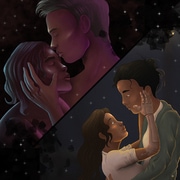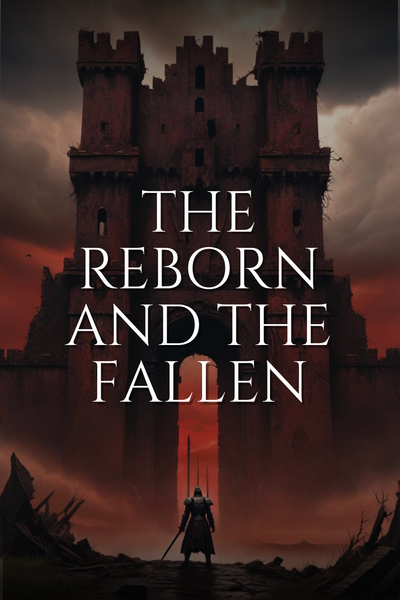Outside, the fortress stirred with the sounds of distant conflict. The clash of steel, the cries of warriors, and the rumble of heavy hooves formed a grim symphony that underscored the gravity of the moment. The very walls seemed to pulsate with the memories of ancient wars and unfulfilled oaths, as though the fortress itself was a living relic of a time when honor and duty had once held sway. Eryth stepped from his solitary refuge and into the wide, barren courtyard, his eyes fixed on the horizon where the darkened sky met the crumbling battlements. The wind carried with it the scent of distant fires and the promise of further strife—a reminder that his new journey would be fraught with peril at every turn.
It was here, under the oppressive weight of a twilight that seemed to merge day with endless night, that he finally made his choice. The internal debate that had raged within him for what felt like an eternity reached its crescendo as he drew a deep, shuddering breath. In that exhalation, he felt a release—a letting go of the crippling despair that had once held him prisoner. With a voice that resonated with both defiance and reluctant hope, he spoke aloud to the empty air, his words echoing against the ancient stones: “I accept the curse. I accept the oath and the torment that comes with it. I will serve, not out of submission to despair, but in the hope that through this path—however treacherous and dark—I might yet reclaim the honor that has been denied me.”
The words, once uttered, seemed to alter the very fabric of his being. In that moment of acceptance, the duality within him—the cold, calculated assassin and the tortured soul yearning for redemption—merged into a single, conflicted purpose. His heart, heavy with the blood of a thousand transgressions, began to beat with a renewed cadence. It was a cadence tempered by the quiet strength of resolve, a slow but steady rhythm that promised both suffering and the faint hope of salvation. In accepting the curse laid before him, Eryth knew he was stepping into a realm of endless uncertainty—a domain where each step forward might bring him closer to the abyss or, perhaps, to the distant light of absolution.
There was no grand fanfare as he made this choice; there was no chorus of angels or heavenly proclamation to mark the moment. Instead, it was a quiet, internal reckoning—a solitary vow forged in the silence of his own soul. The very air around him seemed to still, as if the cosmos itself were pausing to witness his resolve. And in that hush, as the dying light of the day gave way to a cold, indifferent night, Eryth felt the presence of Valtherion—a dark, omnipresent force whose influence would now shape his every moment. It was an awareness both oppressive and oddly comforting, a reminder that even in the deepest shadows there could exist a spark of guidance, however cruel its origin.
For the days that followed, Eryth began the arduous process of preparing for the journey that lay ahead. Under the strict, watchful eye of Valtherion’s most trusted lieutenants, he was thrust into a world where every moment was a test of both his physical mettle and the fragile integrity of his soul. He was forced to re-learn the art of combat, to harness the lethal instincts that had once defined him even as he struggled to temper them with a newfound desire for penance. The training was grueling, a relentless barrage of challenges designed to break the spirit and rebuild it anew. Each session left him battered and exhausted, yet paradoxically, it also sparked within him a cautious hope—a belief that perhaps, through this relentless forging in the crucible of conflict, he might emerge as something more than the sum of his sins.
In the dim light of early dawns, as the fortress stirred with the quiet labor of those who had long resigned themselves to fate, Eryth found solace in moments of reflection. He would often wander the ancient corridors in solitude, the echo of his footsteps a constant companion as he contemplated the enormity of his new path. In these quiet moments, the memories of his past—the countless lives ended by his hand, the fleeting moments of cruel satisfaction, and the lingering trace of forbidden love—would rise unbidden. And yet, he learned slowly to face them, to acknowledge that the pain of his former self was not a chain meant to hold him back, but a lesson to be heeded. For every regret was a scar, and every scar was a reminder of a life that might yet be transformed if only he dared to believe that redemption was not an illusion.
There were nights when the specter of despair would close in on him, when the weight of his curse seemed too heavy to bear. In those moments, he would seek out the solitary tower that overlooked the ruins of the battlefield below—a place where the winds whispered ancient secrets and the stars, though obscured by sorrow, shone with a pale, mournful light. There, in the quiet solitude of the night, he would let his guard down, and his heart would ache with the memories of what had been and the desperate longing for what might be. It was in those moments that the forbidden tenderness he had once harbored for Valtherion surfaced unbidden—a longing that was as painful as it was impossible. The memory of that love was a double-edged sword, a source of both strength and profound vulnerability. It reminded him that even in the depths of darkness, there was a flicker of something worth fighting for—a hope that one day, his soul might be cleansed of its myriad stains, that his past might be redeemed by acts of sacrifice and honor.
The very notion of serving under Valtherion—of taking orders from the man who had once commanded both his loyalty and his secret affections—filled him with a tumult of emotions. There was bitterness, for the memory of that love was tainted by betrayal and unspoken longing; there was defiance, for he resented being forced once again into the service of a master whose methods were as ruthless as they were inscrutable; and yet, there was also a fragile, almost imperceptible hope that in this dark alliance, he might find the means to rewrite his destiny. It was a hope born of necessity, forged in the fires of his relentless struggle against the chains of his own making. The very act of accepting the curse was an admission that he had been broken, yet in that brokenness lay the possibility of remaking himself—of rising from the ruins of his past like a phoenix, scarred but unextinguished, towards a future that was as uncertain as it was desperately sought.
So it came to pass that Eryth, with every fiber of his being trembling under the dual weight of defiance and hope, stepped forward to embrace his cursed fate. The men around him watched in silence as he gathered his few belongings—a battered cloak that had seen the ravages of many battles, a sword whose edge was honed by countless acts of ruthless precision, and a locket that contained a faded image of a face he could scarcely recall, yet whose memory stirred a secret longing deep within him. With these meager possessions, he prepared to leave behind the only world he had ever known—a world that had been defined by endless cycles of death and retribution—and to venture into the unknown, into a realm where the only certainty was the bitter promise of redemption.
As he departed from the fortress, his steps measured and resolute, the sun rose slowly over a horizon streaked with the muted colors of sorrow and promise. The sky, vast and indifferent, bore witness to his solitary journey—a journey that would take him across desolate lands, through battlefields stained with the blood of forgotten heroes, and into the very heart of darkness itself. Every mile he traversed was a step deeper into a fate that was both terrifying and inevitable, a fate that would test the limits of his endurance and force him to confront the demons that had haunted him since time immemorial.
The path ahead was shrouded in uncertainty—a labyrinth of treacherous alliances, ancient curses, and relentless enemies who would seek to exploit his inner turmoil for their own gain. Yet, amid that uncertainty, there flickered a fragile light—the hope that through his own acts of penance and defiance, he might one day reclaim a measure of the honor that had been lost to him. It was a hope that burned quietly in his heart, defiant in its persistence despite the overwhelming darkness that sought to consume him. And as he walked that lonely road, his mind was a tumult of memories, regrets, and the whispered promise of redemption—a promise that seemed as distant as the stars yet as real as the blood that still pulsed in his veins.
In the solitude of his journey, Eryth encountered many who had been touched by the same curse of ruin. Some were warriors, their faces lined with the scars of endless battles, who had long ago given up on the idea of redemption. Others were lost souls, wandering the borderlands between hope and despair, clinging to the faintest memories of a better past. In their eyes, he saw reflections of his own pain, the shared burden of a legacy that had been cast in darkness. And in their whispered stories of loss and longing, he found both a mirror of his own torment and a faint, unspoken promise that even the most broken of lives might be mended if one dared to believe in the possibility of change.
Thus, with each step and every passing day, Eryth began to accept the curse that had been thrust upon him—not as a fate to be condemned, but as a crucible through which his soul might be purified. The acceptance was not born of resignation but of a defiant resolve; it was an acknowledgement that the path to redemption was paved with the ashes of the past, and that only by embracing his own darkness could he hope to ignite the spark of transformation. With each trial he faced, with every enemy vanquished and every sorrow endured, he sought to chip away at the chains of his notorious past, to free himself from the specter of the assassin he had once been, and to forge a new destiny out of the shattered remnants of his soul.
In the cold light of dawn, as he marched forward under the indifferent gaze of the heavens, Eryth’s heart beat with a solemn determination. The curse he now bore was a constant reminder of the cost of his past transgressions, but it was also a beacon—an inescapable call to transcend the limits of a life steeped in blood and ruin. And though the journey ahead was fraught with peril, and though the darkness that clung to his every step threatened to smother the fragile light of hope, he resolved that he would not falter. For in accepting the curse, he had also accepted the possibility of redemption—a possibility that, however remote, was his alone to claim.
So it was, under a sky heavy with the weight of unspoken oaths and ancient sorrow, that Eryth began his new journey. With each measured step into the uncertain wilderness beyond the ruined fortress, he carried with him the memory of every lost life, every act of brutality, and every tender, forbidden moment of love that had defined his past. The path was long and treacherous, lined with the remnants of forgotten battles and the specters of unatoned sins. Yet, in that long, winding road, he found the strength to push onward—a strength born not of denial but of a fierce, unyielding resolve to rise above the curse and, in time, to become the architect of his own redemption.
And so, as the light of a new day broke over the horizon, casting its pale glow upon a world scarred by endless conflict, Eryth—haunted by memories, driven by defiance, and sustained by a fragile hope—stepped forward into the great unknown. In the depths of his tormented heart, he knew that the road ahead would demand more than mere survival; it would demand the courage to confront the darkest corners of his own soul, to face the sins that had defined him, and to embrace the arduous, uncertain promise of redemption. Though the curse he bore was a heavy yoke, he now saw it as both a reminder of his past and a key to his future—a key that, if he could master it, might unlock the door to a destiny that was, for the first time in a long while, his own to shape.
Thus, with the rising sun as his solitary witness and the echoes of an old, tortured love murmuring like a distant refrain in his mind, Eryth advanced into the realm of destiny. Every step was a defiant act of acceptance, every breath a silent vow that no matter how deep the scars of his past, he would strive to transform them into the stepping stones of a future redeemed. And in that monumental journey—from the despair of a cursed existence to the uncertain promise of atonement—Eryth found that even the darkest soul might, through sheer force of will and the relentless pursuit of redemption, one day emerge reborn in the light of a new dawn.
It was the beginning of a perilous odyssey, a journey under the command of the very man he had once served and secretly loved, and yet it was also the moment of his greatest defiance—a moment when he chose to accept the curse, not as a death sentence, but as the bitter, transformative elixir that might yet cleanse him of his sins. And so, with the ruins of his past echoing behind him and the uncertain road of redemption unfurling before him, Eryth stepped boldly into his destiny, a man reborn in ruin and determined to shape his fate, even if it meant walking forever in the shadow of his own dark legacy.











Comments (0)
See all